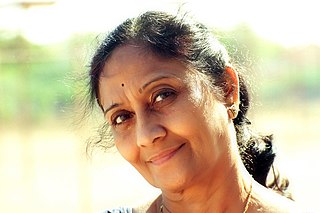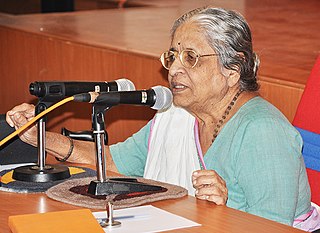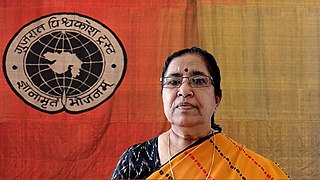Ila Arab Mehta | |
|---|---|
 Ila Arab Mehta in 1995 | |
| Born | 16 June 1938 Mumbai |
| Occupation | Novelist and short story |
| Language | Gujarati |
| Nationality | Indian |
| Signature | |
 | |
Ila Arab Mehta (born 16 June 1938) is a Gujarati novelist and story writer from Gujarat, India.
Ila Arab Mehta | |
|---|---|
 Ila Arab Mehta in 1995 | |
| Born | 16 June 1938 Mumbai |
| Occupation | Novelist and short story |
| Language | Gujarati |
| Nationality | Indian |
| Signature | |
 | |
Ila Arab Mehta (born 16 June 1938) is a Gujarati novelist and story writer from Gujarat, India.
Mehta was born on 16 June 1938 at Bombay (now Mumbai) to Gujarati writer Gunvantrai Acharya. Her family belonged to Jamnagar. She completed her schooling from Jamnagar, Rajkot and Mumbai. She completed BA with Gujarati in 1958 from Ramnarain Ruia College and MA in 1960. She taught at Ruia College from 1960 to 1967 and later at St. Xavier's College, Mumbai from 1970 to her retirement in 2000. [1] [2] [3] [4]
In her early days, Mehta wrote in Akhand Anand, Navneet and Stree Jeevan magazines. She has written several novels including Trikonni Tran Rekhao (1966), Thijelo Akar (1970), Radha (1972), Ek Hata Diwan Bahadur (1976), Batris Laksho (1976), Varasdar (1978), Avati Kalno Sooraj (1979), Batris Putalini Vedana (1982), Ane Mrityu (1982), Dariyano Manas (1985), Vasant Chhlake (1987), Nag Pariksha, Panch Pagala Prithvi Par (1995), The New Life (2004), Parpotani Aankh (1988), Zili Me Kumpal Hathelima (2007). Jaherkhabarno MAnas (1985), Shabne Naam Hotu Nathi (1981) are novels with different subjects. [1] [2] [4] Her novel Vaad (2011) is translated in English as Fence (2015) by Rita Kothari. [5] Her novel Batris Putlini Vedna is a story of women's struggle against injustice done to them and their attempt to establish their own identity. It centred around Anuradha, a main protagonist of the novel, and presents her anger against male chauvinism in the same way as Kundanika Kapadia's Saat Paglan Akashman (Seven Steps in the Sky; 1994). [6]
Ek Cigarette Ek Dhupsali (1981), Viena-Woods (1989), Bhagyarekha (1995), Balavo Balvi Balvu (1998), Yom Kippur (2006). Ila Arab Mehtano Varta Vaibhav (2009) are her collections of stories. She has edited Varsha Adaljani Shreshth Vartao (1991), selected stories of Varsha Adalja. [1] [2] [4]
Mrityu Naam Parpota Mare (1984) is her compilation of literary works by various authors on death. [2]
She has been awarded by Gujarat Sahitya Akademi, Maharashtra Gujarati Sahitya Akademi, and Gujarati Sahitya Parishad. [2]
She married Arab Mehta, a doctor, in 1964 and has a son, Salil and a daughter, Sonali. She lives in Mumbai. Her father Gunvantrai Acharya and her younger sister Varsha Adalja are also Gujarati writers. [2] [8]

Gujarati Sahitya Parishad is a literary organisation for the promotion of Gujarati literature located in Ahmedabad, Gujarat, India. It was founded by Ranjitram Mehta with the aim of creating literature appealing to all classes of society and cultivating a literary sense among the people. Many prominent people including Mahatma Gandhi and Kanaiyalal Munshi have presided over the organisation. Its headquarters, located on Ashram Road, is known as Govardhan Bhavan. It has a conference hall and library.
The history of Gujarati literature may be traced to 1000 AD, and this literature has flourished since then to the present. It is unique in having almost no patronage from a ruling dynasty, other than its composers.

Ranjitram Vavabhai Mehta was a Gujarati language writer from British India.
Ranjitram Suvarna Chandrak, also known as the Ranjitram Gold Medal, was founded by Gujarat Sahitya Sabha and is considered the highest literary award in Gujarati literature. The award is named after renowned Gujarati writer Ranjitram Mehta. It is awarded since 1928.

Kumarpal Balabhai Desai is an author, critic, editor, journalist, columnist and translator from Gujarat, India. He studied and later taught at the Gujarat University. He is associated with several social and Gujarati literary organisations such as Gujarati Sahitya Parishad. He has written and edited more than hundred books including biographies and several works on Jainism. He was awarded the Padma Shri in 2004.

Tarak Janubhai Mehta was an Indian columnist, humourist, writer and playwright, who was a well-known figure in Gujarati theatre. Mehta is widely known for his column Duniya Ne Undha Chasma.

Varsha Mahendra Adalja is an Indian Gujarati language feminist novelist, playwright and negotiator who won the 1995 Sahitya Akademi Award for Gujarati language for her novel Ansar. She is also a dramatist, writing for stage plays, screenplays, and radio.

Dhiruben Gordhanbhai Patel was an Indian novelist, playwright and translator.

Gunvantrai Popatbhai Acharya was a Gujarati language novelist and journalist from India. His experience with seafarers impacted his adventure and novel writings. His works include several historical fiction novels.

Anantrai Manishankar Raval was a Gujarati critic and editor from India. Born and studied in Amreli, he worked briefly with a daily. He taught at several colleges before joining government as a director of language department. He wrote criticism chiefly under the pen name Shaunak and edited several works of Gujarati literature and litterateurs.

Madhu Rye is a Gujarati playwright, novelist and story writer. Born in Gujarat and educated at Calcutta, he started writing in the 1960s and became known for his stories and plays. His experience at the University of Hawaii introduced him to experimental writing and improvisations as writing aid, which later led to a movement against absurd theatre. He moved to the US in 1974 and has lived there since. He chiefly wrote novels, short stories and plays. His plays were successful and have been adapted into several languages and media. He has adapted his novels into plays and some plays into novels. The most notable is Kimball Ravenswood, which was loosely adapted into a Hindi TV series Mr. Yogi (1989), and a Hindi film, What's Your Rashee? (2009).

Anila Amrutlal Dalal is Gujarati critic and translator.

Akhepatar is a Gujarati language novel written by Bindu Bhatt. The book was awarded the Sahitya Akademi Award for Gujarati in 2003 and received critical acclaim from several Gujarati authors, including Mansukh Salla and Chandrakant Topiwala.
Kamal Vora is an Indian Gujarati-language poet and editor from Mumbai, India. He is an editor of Etad, a quarterly Gujarati literary magazine.

Kundanika Kapadia was an Indian novelist, story writer and essayist from Gujarat.

Shrikant Vallabhdas Shah was a Gujarati poet, novelist, short story writer and playwright from Gujarat, India, mainly known for his experimental novel Asti (1966).
Jaya Vallabhdas Mehta is a Gujarati poet, critic and translator from Gujarat, India. She was educated and later worked at SNDT Women's University.
Janmabhoomi (જન્મભૂમિ) is an Indian Gujarati-language evening daily newspaper, owned by the Saurashtra Trust. It is headquartered in Mumbai, Maharastra. Janmabhoomi was launched in 1934 as an evening paper The newspaper publishes 10-12 pages every day, including an editorial page and an op-ed page. The motto of the newspaper is 'जननी जन्मभूमिश्च स्वर्गादपि गरीयसी'.

Sharifa Vijaliwala is an Indian Gujarati language writer, critic, translator and editor from Surat, Gujarat, India. She is a recipient of a 2018 Sahitya Akademi Award for Vibhajanni Vyatha, a collection of critical essays in Gujarati, and has won several Gujarat Sahitya Akademi awards for her literary work.
Abhimanyu Acharya is an Indian short story writer and playwright from Gujarat, India. He received the 2020 Yuva Puraskar for his short story collection Padchhayao Vacche.